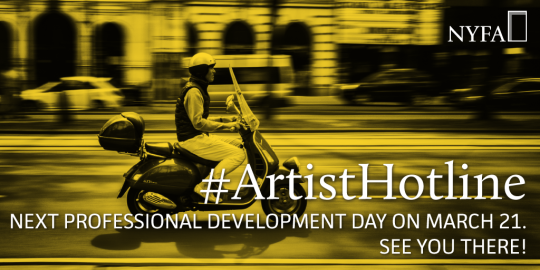Save the Date | #ArtistHotline Returns March 21, 2018
Get the recap from February’s Chat, and then, mark your calendar for March!
The monthly Artist Professional Development Day takes place on the third Wednesday of each month on Twitter; to participate you’ll need a Twitter account and to include #ArtistHotline with each of your Tweets. #ArtistHotline takes place from 11:00 AM – 4:00 PM EST and includes an Open Chat between 11:00 AM – 1:00 PM EST, a special Guest Chat between 1:00 PM – 3:00 PM EST with artists and arts professionals, and a Q&A with an arts administrator from 3:00 – 4:00 PM EST. Read more about how you can participate here.
February Topics
During the Open Chat portion of February’s #ArtistHotline, NYFA staff and arts professionals shared a range of arts career tips, such as:
- Working on an “elevator pitch?” Remember to keep the pitch short, and follow up with a question to show your interest in forming a relationship, rather than in simply promoting your project;
- When networking, encourage yourself to go outside your comfort zone, and do your research on who you may meet at conferences and other events;
- and more!
Key Takeaways from the “Cross-Sector Collaborations” Guest Chat
After the Open Chat, we invite a group of virtual panelists to dive into a particular topic. In February, dark fantasy writer Ksenia Anske, poet Denice Frohman, and illustrator Kyle T Webster shared their experiences with collaborations. This Guest Chat panel shared insights gleaned from a range of collaborative experiences, from interdisciplinary artist projects and commissions to fan engagement. Below are a few takeaways from Anske, Frohman, and Webster:
- Find opportunities to collaborate that align with your values and your aesthetic by sharing your creative process online and in-person, and support other artists. You will attract like-minded supporters and potential collaborators;
- Set clear expectations with your collaborator. If you do not have access to legal counsel, you can still create a written contract, taking advantage of standard contract templates. Be wary of work-for-hire contracts, as you most likely won’t want to sign away your copyrights;
- Recognize your power as an artist, and stand up for the value of your work. Clients and collaborators often need you just as much as you need them. Each commission is an opportunity to educate clients about fair terms and compensation, and if that opportunity undervalues you or your work, it is OK to say “no;”
- Don’t be afraid to insist on the integrity of your piece or process. State that you welcome creative feedback, but there are certain things you are unable to compromise, such as the social justice aspect of your work;
- Stay organized. Use tools like Social CRM (customer relationship management) to keep track of who you’ve met and who has supported your work so you can engage with them again in the future. Dedicate chunks of time to similar projects, turn your screen off for set amounts of time, and pre-schedule breaks and stick to them;
- Build your tribe. Cultivate a base of subscribers, supporters, and customers by providing small bits of free content to demonstrate that your work is worth supporting, either financially or through promotion and testimonials. Consider adding a donation button to your site or using a subscription platform to support yourself even while you give away some work;
- Seek support. When negotiating commissions, reach out to more established artists or industry professionals for advice and resources, such as language they use when negotiating contracts. Galvanize support for cross-sector collaborations among your local arts council and other local organizations, or organizations with a similar mission.
“Taxes for Artists” Arts Administrator Q&A
We close out each month’s #ArtistHotline with a one-hour Q&A with an arts administrator. In the wake of national tax reform, we decided to invite Elaine Grogan Luttrull of Minerva Financial Arts to share her expertise for a "Taxes for Artists” Q&A. Grogan Luttrull provided a few pointers on how artists can prepare themselves for April 17, 2018, the deadline to submit your 2017 taxes:
- Determine if your art practice is a business or a hobby according to the IRS;
- One guideline is to aim to make money in 3 out of 5 years, but really, it’s more important to treat the practice professionally by keeping books and records, dedicating time and energy to it regularly, and seeking to improve;
- Save four key pieces of info for each transaction: (1) the date, (2) the amount, (3) the counterparty (who did you pay or who paid you?), and (4) the business purpose;
- Save the information in any format you like. Most people use some sort of digital tracking, plus receipts and credit card/bank statements;
- Set aside time on your calendar (once a month or once a week) to make sure you don’t fall too behind on your records, making sure that this time is not the time of day when you are at your most creative;
- If outsourcing your taxes, look for someone who “gets” what you do and understands the business of your art.
Read the full day’s conversation in our recap on Wakelet, and join us for the next #ArtistHotline on Wednesday, March 21, 2018, from 11:00 AM – 4:00 PM EST. As part of the day, we’ll host a “Resources for Performing Artists” Guest Chat from 1:00 PM – 3:00 PM EST. In the meantime, stay up-to-date with NYFA and get updates on this month’s #ArtistHotline by following us at @nyfacurrent on Twitter.
Inspired by the NYFA Source Hotline, #ArtistHotline is an initiative dedicated to creating an ongoing online conversation around the professional side of artistic practice. #ArtistHotline occurs on the third Wednesday of each month on Twitter. Our goal is to help artists discover the resources needed, online and off, to develop sustainable careers.
This initiative is supported by the Emily Hall Tremaine Foundation.
Image: Dragan Brankovic (d26b73)





